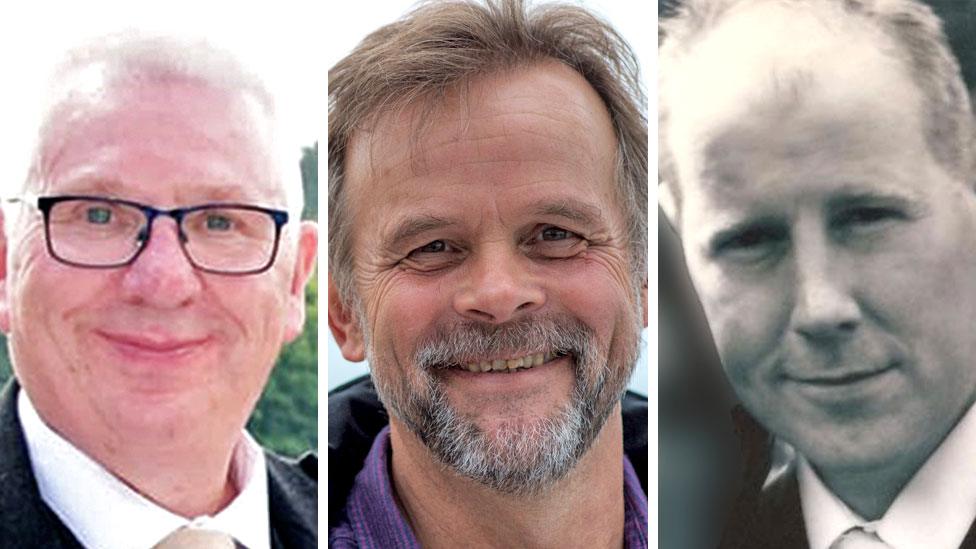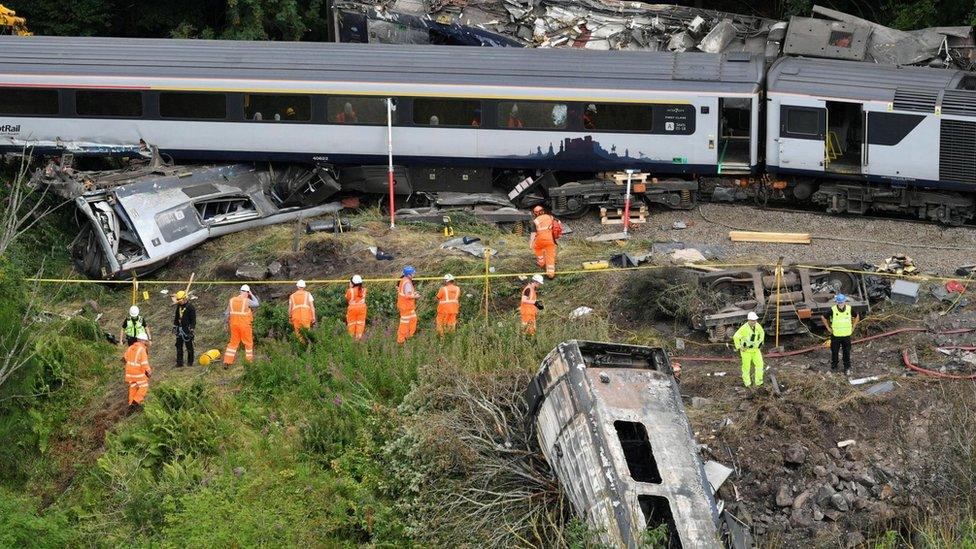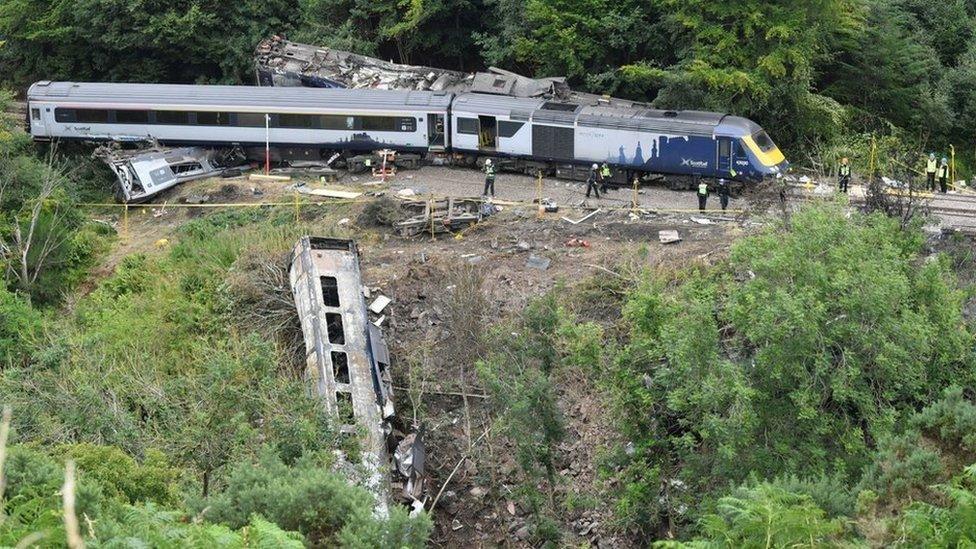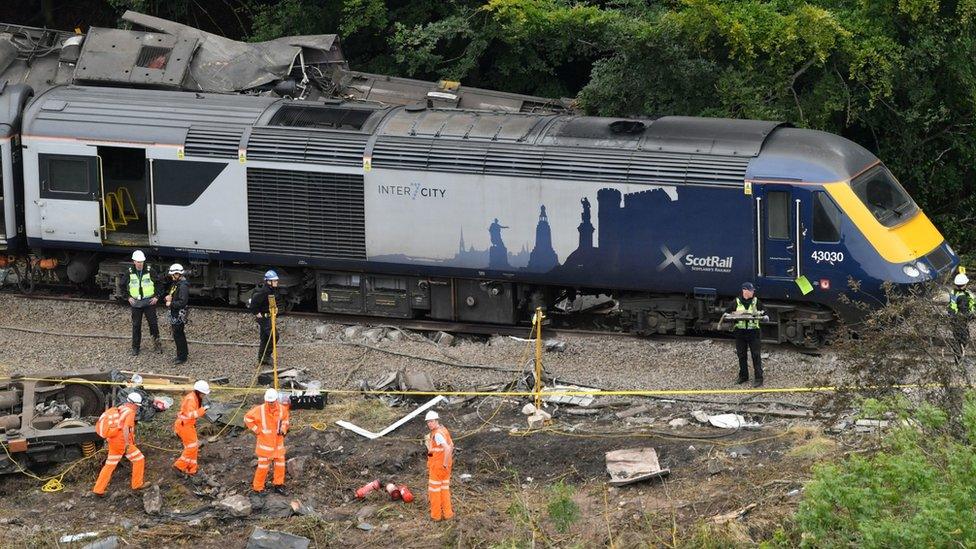Stonehaven crash: Network Rail fined £6.7m over fatal derailment
- Published

Donald Dinnie, Christopher Stuchbury and Brett McCullough died in the crash
Network Rail has been fined £6.7m after admitting a series of failings which led to the deaths of three people in a train crash near Stonehaven.
The Aberdeen to Glasgow service derailed at Carmont after hitting a landslide following heavy rain.
Network Rail pleaded guilty to a number of maintenance and inspection failures before the crash in August 2020.
It also admitted failing to warn the driver that part of the track was unsafe or tell him to reduce his speed.
Driver Brett McCullough, 45, conductor Donald Dinnie, 58, and passenger Christopher Stuchbury, 62, died in the crash.
The judge, Lord Matthews, said no penalty could compensate for the loss suffered by the families of those who died and of the six people on board the train who were injured.
Speaking outside court, Ray McCullough, the father of the train's driver, said the fine was "not enough".
"At the end of the day, the train should not have gone out," he said.
Kevin Lindsay, Scottish organiser for train drivers' union Aslef, added that the sentence offered "no comfort".
It has also been announced that a fatal accident inquiry will be held into the crash.

The Crown Office and Procurator Fiscal Service said the aim was to help avoid a similar incident happening again.
The train hit a landslide near Stonehaven in August 2020 after heavy rain in an area where a drainage system had been incorrectly installed.
The 06:38 service to Glasgow had been unable to complete its journey due to the conditions and was returning to Aberdeen when the accident happened.
A recording of the driver showed he queried with a signaller if any reduced speed was needed to return north. He was told everything was fine for normal speed.
The train struck debris from a landslide on the track, derail and collided with a bridge parapet.
Passing sentence at the High Court in Aberdeen, Lord Matthews said that very few people who saw the images of the crash would ever forget them.
Judge Lord Matthews hands down £6.7m fine over fatal rail crash 'calamity'
"But as distressing as these images are, they were only of machines. Their loss pales into insignificance compared to that of those who tragically lost loved ones in the calamity and those who were passengers on the train.
"All of them have to live with the memories and the effects of this tragedy."
The judge said opportunities to take appropriate action may have been missed and that the level of culpability was high, with a large number of people exposed to risk over the years.
The weather conditions before the crash had been "unprecedented".
Lord Matthews added that the rail operator would have been fined £10m if the case had gone to trial.


In the three years since the crash a long investigation has tried to answer three key questions: what went wrong, who's to blame, and what can be done to prevent a similar tragedy in future?
Among the specific findings, highlighted in court, was the fact that a drainage system in the area was incorrectly installed by the giant construction firm Carillion, which has since gone into liquidation.
Network Rail engineers had not fully inspected this drainage system. So problems were spotted too late.
The company has now been fined £6.7m - but officials at the RMT rail union are angry.
They say Network Rail has got off lightly and that corporate manslaughter charges must be made an option in similar cases in future.

Representing Network Rail, defence counsel Peter Gray said the three men died in "the most appalling and tragic circumstances".
He said the company extended the "deepest and most profound sympathies" to relatives, and that what happened had "shook Network Rail to its core".
"Its acceptance of its shortcomings was both immediate and genuine," he said.
"Its co-operation with all investigations was absolute. And its response to ensure so far as reasonably possible that such tragedy should not be repeated was comprehensive and continues."
Alex Hynes, managing director of Scotland's Railway, added that the incident would be "etched on the industry's mind forever, and make us determined to keep improving the safety of our network every day".
The Aslef union said it was a tragedy that "could and should have been avoided".
"This is not justice in the truest sense of the word, nor in any way does it ensure those involved are held to account," said Kevin Lindsay.
"People within organisations need to be held accountable, it is them, not the organisation, that makes decisions."
Related topics
- Published8 September 2023

- Published7 September 2023

- Published7 September 2023
